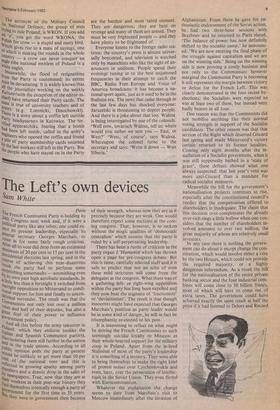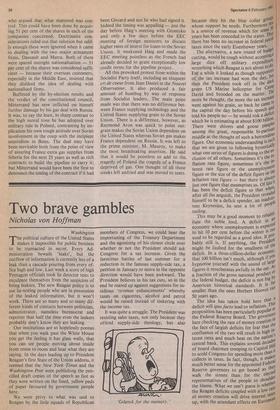The Left's own devices
White Paris The French Communist Party is holding its 44th Congress next week and, if it were a political party like any other, one could ex- gi its present leadership, especially its general secretary Georges Marchais, to collie in for some fairly rough criticism. After all its vote did drop from an estimated minimum of 20 per cent to 15 per cent in the Presidential elections last spring, and in the course of achieving this near-disastrous 'esillt the party had to perform some tu, nishing somersaults — astonishing even Ylis own past high acrobatic standards, In a little less than a fortnight it switched from ,°11iright opposition to Mitterrand to condi- `1911a1 support for him and finally to uncon- ,nlonal surrender. The result was that the communists not only lost over a million votes and half of their deputies, but also a
great deal of their power to influence government policy.
IPoland, And all this before the army takeover in talian which they endorse (unlike the ;,_d tallan and Spanish Communist parties), isolating them still further in the nation an inthe trade unions. According to all
opinion polls the party at present would be unlikely to get more than 10 per
cent of the national vote and this is reflected in growing apathy among party members and a drastic drop in the sales of
the ewspapers. eakest in t The rue, now that they are at wir post-war history they
Ind themselves ironically enough a party of rvernment for the first time in 35 years. 14 they were in government then because
of their strength, whereas now they are in it precisely because they are weak. One would therefore expect some ructions at the com- ing congress. That, however, is to reckon without the magic qualities of 'democratic centralism' which ensures that the party is ruled by a self-perpetuating leadership.
There has been a rustle of criticism in the party organ L'Humanite which has thrown open a page for pre-congress debate. But this is tame, carefully selected stuff and it is safe to predict that not an echo of even these mild strictures will come from the delegates at the congress. What there was of a gathering left- or right-wing opposition within the party has long been expelled and they now bear the stigmata of 'fractionists' or `deviationists'. The result is that though innocents might have expected that Georges Marchais's position as party leader would be in some kind of danger, he will in fact be triumphantly re-elected to his post.
It is interesting to reflect on what might be driving the French Communists to such seemingly suicidal loyalty to Moscow as their whole-hearted support for the military coup in Poland. Apart from the in-bred Stalinism of most of the party's leadership it is something of a mystery. They were able to bring themselves to make the right kind of protest noises over Czechoslovakia and even, later, over the persecution of intellec- tuals in the Soviet Union. They even flirted with Eurocommunism.
Whatever the explanation the change seems to date from Marchais's visit to Moscow immediately after the invasion of Afghanistan. From there he gage his en- thusiastic endorsement of the Soviet action, he had two three-hour sessions with Brezhnev and he returned to Paris elated. `The balance of power has now definitely shifted to the socialist camp,' he announc- ed. 'We are now entering the final phase of the struggle against capitalism and we are on the winning side.' Being on the winning side is now proving a costly business and not only to the Communists: however marginal the Communist Party is becoming it still represents the margin between victory or defeat for the French Left. This was clearly demonstrated in the four recent by- elections: the Socialists were expected to win at least two of them, but instead were badly beaten in all four.
One reason was that the Communists did not mobilise anything like their normal voting strength in support of the Socialist candidates. The other reason was that that section of the Right which deserted Giscard last spring and made Mitterrand's victory certain returned to its former loyalties. Coming only eight months after the in- stallation of a Socialist government, when it was still supposedly bathed in a `state of grace', these defeats showed what one always suspected: that last year's vote was more anti-Giscard than a mandate for radical socialist measures.
Meanwhile the bill for the government's nationalisation projects continues to rise, especially after the constitutional council's verdict that the compensation offered to shareholders is inadequate. The claim that this decision over-compensates the already over-rich rings a little hollow when one con- siders that the number of shareholders in- volved amounts to over two million, the great majority of whom are relatively small investors.
In any case there is nothing the govern- ment can do about it except change the con- stitution, which would involve either a vote by the two Houses, which could not provide the required majority, or a highly dangerous referendum. As a result the bill for the nationalisation of the entire private banking sector and the four industrial com- bines will come close to 50 billion francs, most of which will have to come out of extra taxes. The government could have achieved exactly the same result at half the price if it had listened to Delors and Rocard who argued that what mattered was con- trol. This could have been done by acquir- ing 51 per cent of the shares in each of the companies concerned. Doctrinaire con- siderations ruled out that solution but odd- ly enough these were ignored when it came to dealing with the two major armament firms, Dassault and Matra. Both of them were spared outright nationalisation — 51 per cent of the shares was considered suffi- cient — because their overseas customers, especially in the Middle East, insisted that they disliked the idea of dealing with nationalised firms.
Buffeted by the by-election results and the verdict of the constitutional council, Mitterrand has now inflicted on himself further damage by his gas deal with Russia. It was, to say the least, in sharp contrast to the high moral tone he has adopted over military rule in Poland, contrasting by im- plication his own tough attitude over Soviet involvement in the coup with the incipient neutralism in Bonn. The deal may have been inevitable both from the point of view of assuring France extra gas supplies from Siberia for the next 25 years as well as rich contracts to build the pipeline to carry it; but Mitterrand would have been the first to denounce the timing of the contract if it had been Giscard and not he who had signed it. Indeed the timing was appalling — just the day before Haig's meeting with Gromyko and only a few days before the EEC meeting of foreign ministers to discuss higher rates of interst for loans to the Soviet Union. It weakened Haig and made the EEC meeting pointless as the French had already decided to grant exceptionally low credit terms for the pipeline project.
All this provoked protest from within the Socialist Party itself, including an eloquent cri de coeur from Jean Daniel in the Nouvel Observateur. It also produced a fair amount of humbug by way of response from Socialist leaders. The main point made was that there was no difference bet- ween France supplying technology and the United States supplying grain to the Soviet Union. There is a difference, however, as Raymond Aron was quick to point out: grain makes the Soviet Union dependent on the United States whereas Soviet gas makes France dependent on Russia. It was left to the prime minister, M. Mauroy, to make the most breathtaking assertion. He said that it would be pointless to add to the. tragedy of Poland the tragedy of a France deprived of gas. One thought of all those steaks left unfried and was moved to tears.

























 Previous page
Previous page